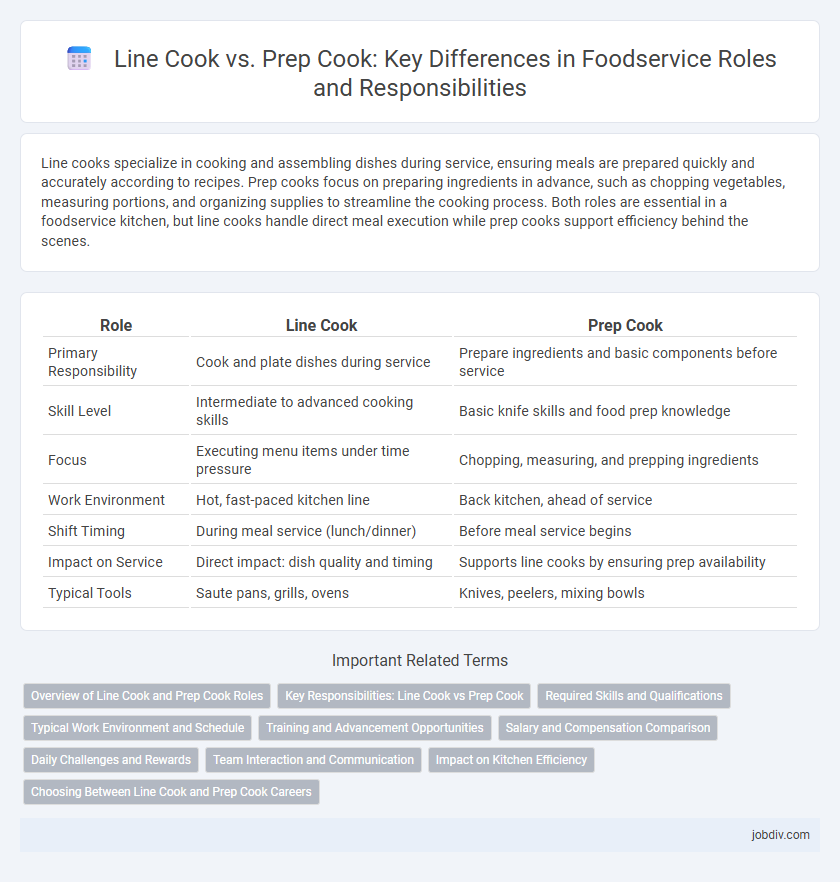Line cooks specialize in cooking and assembling dishes during service, ensuring meals are prepared quickly and accurately according to recipes. Prep cooks focus on preparing ingredients in advance, such as chopping vegetables, measuring portions, and organizing supplies to streamline the cooking process. Both roles are essential in a foodservice kitchen, but line cooks handle direct meal execution while prep cooks support efficiency behind the scenes.
Table of Comparison
| Role | Line Cook | Prep Cook |
|---|---|---|
| Primary Responsibility | Cook and plate dishes during service | Prepare ingredients and basic components before service |
| Skill Level | Intermediate to advanced cooking skills | Basic knife skills and food prep knowledge |
| Focus | Executing menu items under time pressure | Chopping, measuring, and prepping ingredients |
| Work Environment | Hot, fast-paced kitchen line | Back kitchen, ahead of service |
| Shift Timing | During meal service (lunch/dinner) | Before meal service begins |
| Impact on Service | Direct impact: dish quality and timing | Supports line cooks by ensuring prep availability |
| Typical Tools | Saute pans, grills, ovens | Knives, peelers, mixing bowls |
Overview of Line Cook and Prep Cook Roles
Line cooks execute cooking and plating orders during service, managing heat stations like grill, saute, or fry to ensure timely and consistent dish preparation. Prep cooks handle ingredient preparation prior to service, including chopping vegetables, portioning proteins, and making sauces, ensuring all components are ready for the line cooks. Both roles are critical in a commercial kitchen, with prep cooks supporting efficient service flow and line cooks responsible for final food presentation and quality.
Key Responsibilities: Line Cook vs Prep Cook
Line cooks are responsible for cooking and plating dishes according to menu specifications, managing multiple cooking stations, and ensuring food quality under time constraints. Prep cooks focus on preparing ingredients by chopping vegetables, marinating proteins, and portioning items to support efficient service. Both roles require attention to hygiene standards, but line cooks handle direct food preparation during service while prep cooks work ahead of service hours.
Required Skills and Qualifications
Line cooks require proficiency in cooking techniques, ability to handle high-pressure kitchen environments, and knowledge of food safety standards. Prep cooks must possess strong knife skills, attention to detail in ingredient preparation, and basic understanding of kitchen hygiene. Both roles demand teamwork, time management, and the ability to follow standardized recipes accurately.
Typical Work Environment and Schedule
Line cooks typically work in fast-paced, high-pressure kitchen environments such as restaurants, hotels, and catering services, often standing for long hours during peak dining times. Prep cooks usually operate in more controlled, less chaotic back-of-house areas, preparing ingredients before service begins, with schedules that often start earlier and may end earlier than line cooks. Both roles frequently require evening, weekend, and holiday shifts, reflecting the irregular hours common in the foodservice industry.
Training and Advancement Opportunities
Line cooks receive specialized training in cooking techniques, plating, and timing to handle hot stations efficiently, which accelerates their skill development in high-pressure environments. Prep cooks focus on foundational skills like chopping, measuring, and basic ingredient preparation, serving as an entry point into kitchen operations with fewer demands but essential for kitchen readiness. Advancement opportunities for line cooks often include sous chef or station chef roles due to their hands-on experience with final dish execution, while prep cooks typically advance by mastering prep tasks before moving into line cook positions.
Salary and Compensation Comparison
Line cooks typically earn higher salaries than prep cooks due to their direct involvement in cooking and plating dishes, with average wages ranging from $14 to $18 per hour compared to prep cooks who earn between $11 and $14 per hour. Compensation packages for line cooks often include tips and performance bonuses, enhancing overall earnings potential, while prep cooks usually receive standard hourly pay with limited additional incentives. Experience, location, and establishment type significantly influence salary variations within both roles in the foodservice industry.
Daily Challenges and Rewards
Line cooks face the daily challenge of managing high-pressure cooking stations during peak hours, requiring precise timing and multitasking skills to deliver consistent dish quality. Prep cooks handle the demanding task of organizing ingredients and maintaining inventory, ensuring smooth kitchen operations before service begins. Both roles offer rewards in skill development and contribute significantly to the efficiency and success of a foodservice establishment.
Team Interaction and Communication
Line cooks and prep cooks play distinct roles in foodservice kitchens that demand different levels of team interaction and communication. Line cooks must coordinate closely with servers, sous chefs, and other kitchen staff during service to ensure timely and accurate dish preparation, requiring rapid, clear communication under pressure. Prep cooks operate more independently in the kitchen, focusing on ingredient preparation and organization with periodic check-ins, fostering a supportive communication style that prioritizes accuracy and readiness for the line cooks.
Impact on Kitchen Efficiency
Line cooks enhance kitchen efficiency by expertly executing dishes during service, ensuring timely order fulfillment and minimizing wait times. Prep cooks optimize the workflow by preparing ingredients in advance, reducing bottlenecks during peak hours. Coordination between line cooks and prep cooks streamlines operations, increases productivity, and sustains high-quality food output.
Choosing Between Line Cook and Prep Cook Careers
Choosing between a line cook and a prep cook career depends on skill level, work environment, and career goals within the foodservice industry. Line cooks handle direct cooking tasks during service, requiring timing, multitasking, and culinary expertise, while prep cooks focus on ingredient preparation, knife skills, and organizing stations before service. Aspiring culinary professionals should assess their preference for high-pressure, fast-paced cooking or supportive, behind-the-scenes food preparation to make an informed decision.
Line Cook vs Prep Cook Infographic

 jobdiv.com
jobdiv.com